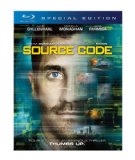| Reviews & Columns |
|
Reviews DVD TV on DVD Blu-ray 4K UHD International DVDs In Theaters Reviews by Studio Video Games Features Collector Series DVDs Easter Egg Database Interviews DVD Talk Radio Feature Articles Columns Anime Talk DVD Savant Horror DVDs The M.O.D. Squad Art House HD Talk Silent DVD
|
DVD Talk Forum |
|
|
| Resources |
|
DVD Price Search Customer Service #'s RCE Info Links |
|
Columns
|
|
|
Source Code
Summit Entertainment // PG-13 // July 26, 2011
List Price: $30.49 [Buy now and save at Amazon]
The Film:
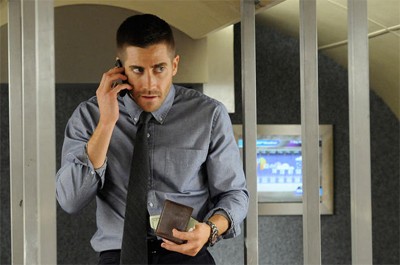 Duncan Jones' Moon is a daunting act to follow; within a meditation on loneliness, science, and the extent humanity reaches for resources, the burgeoning director crafted an atmospheric cipher about the significance of individuality out of measured influence from Kubrick's 2001: A Space Odyssey. Source Code marks his venture into bigger-budgeted science-fiction, and it appears to aim for similarly lofty standards by focusing on the nature of choices, fortune, and surveying both in a disastrous situation through, in a sense, "time travel". The fact that it doesn't telegraph the same cerebral punch isn't a slight, as the purpose behind each differs: one revels in cosmos and contemplation, while the other careens through thrills and the occasional explosive burst in the nebulous of undiscovered science. Vigor and some smart flirtations with forethought instead drive this suspenseful second outing from Jones, a less introspective but nevertheless catching achievement.
Duncan Jones' Moon is a daunting act to follow; within a meditation on loneliness, science, and the extent humanity reaches for resources, the burgeoning director crafted an atmospheric cipher about the significance of individuality out of measured influence from Kubrick's 2001: A Space Odyssey. Source Code marks his venture into bigger-budgeted science-fiction, and it appears to aim for similarly lofty standards by focusing on the nature of choices, fortune, and surveying both in a disastrous situation through, in a sense, "time travel". The fact that it doesn't telegraph the same cerebral punch isn't a slight, as the purpose behind each differs: one revels in cosmos and contemplation, while the other careens through thrills and the occasional explosive burst in the nebulous of undiscovered science. Vigor and some smart flirtations with forethought instead drive this suspenseful second outing from Jones, a less introspective but nevertheless catching achievement.
Penned by Species sequel writer Ben Ripley, the concept drops an army helicopter pilot, Coltor Stevens (Jake Gyllenhaal, Brokeback Mountain), in a passenger car of a commuter tram leading into Chicago, only he doesn't know how he arrived and why the woman (Michelle Monaghan, Kiss Kiss, Bang Bang) sitting across from him keeps using the name "Sean" in her casual, flirtatious chatting. After eight minutes of confusion -- accompanied by the popping of an energy drink, the spill of coffee of his shoe, the stamping of a tram ticket, and suspicious glancing about at the passengers -- an explosion engulfs the tram and Colter abruptly pops into a dark room cluttered with computer screens and mechanical devices. He discovers, through guidance from Capt. Colleen Goodwin (Vera Farmiga, Up In the Air) over a camera connection, that he's just relived the last eight minutes in the life of Sean Fentress before a terror attack occurred, because he's implanted in a secret military "source code" project to discover who set off the bomb. And he's going to have to go in again -- and again -- to cull more details.
The explanation behind the way time would be recreated was something that both sparked my curiosity and caused some trepidation upon entering Jones' picture, but Ben Ripley's script -- a nimble mix of Groundhog Day playfulness with Philip K. Dick-caliber gravity -- navigates the premise with a steady hand and a clever eye. Explained as something of a neural recording (a "dimming lightbulb") filtered through a complex computer network that blends projected memories with technological metaphysics, the science-fiction infrastructure in Source Code convinces without beleaguering the point, tapping into the malleable alternate-reality fabric similar to Inception or The Matrix but with a levelheaded keel. We're not meant to linger on the physiology present in the explanation that wiry Dr. Ruthledge (an over-edgy Jeffrey Wright) rattles off, but you can't help but quietly marvel at its shrewd orchestration and the way it cranks the film's gears like a well-oiled machine.
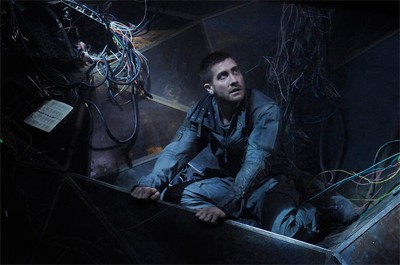 Source Code doesn't dwell on the science that closely because it's a tightly-wound thriller constructed to move along quickly, and move it does. Unlike the methodical progression in Moon that gradually builds mania within a man restrained by his disconnected state, it sprints zealously forward through each crack that Colter takes at solving the case within the eight-minute span, reveling in minor situational shifts -- and how he communicates with the passengers, notably Christina. Energy spikes from the very moment he jolts awake in his seat, using the repetition to propel a sense of Hitchcockian mania within his acclimation to the project; Duncan Jones grabs onto a fierce sense of momentum as he navigates each of the frantic soldier's attempts to discover what's going on, where he won't have to answer for the consequences of actions, such as pulling a gun on a suspect or dishing out $100 from his wallet for assorted purposes.
Source Code doesn't dwell on the science that closely because it's a tightly-wound thriller constructed to move along quickly, and move it does. Unlike the methodical progression in Moon that gradually builds mania within a man restrained by his disconnected state, it sprints zealously forward through each crack that Colter takes at solving the case within the eight-minute span, reveling in minor situational shifts -- and how he communicates with the passengers, notably Christina. Energy spikes from the very moment he jolts awake in his seat, using the repetition to propel a sense of Hitchcockian mania within his acclimation to the project; Duncan Jones grabs onto a fierce sense of momentum as he navigates each of the frantic soldier's attempts to discover what's going on, where he won't have to answer for the consequences of actions, such as pulling a gun on a suspect or dishing out $100 from his wallet for assorted purposes.
Fate and the (in)ability to control one's surroundings also give Source Code an atmospheric, faintly existential draw, where Colter's persistently reminded that his processions through the eight-minute bursts have no consequence or importance outside of his discovery of the terrorist. At least, at first. Interestingly, some of the themes that bolstered Moon carry over here, where a world-weary man can't help but feel trapped in a situation where he's forced to do the bidding of a greater good without being able to address his own concerns -- mainly why the last image he remembers before repeatedly entering the source code is of his helicopter crashing in Iraq. That's where the film's taciturn pensiveness peeks out from the tension; Colter continually makes advances through each blurred attempt, slip-streaming past what are essentially ghosts, while in tandem unearthing the details of his past so he can cope with the clutches of the source code's demands.
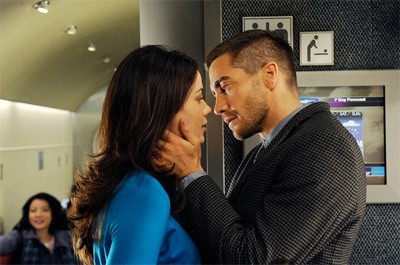 Jake Gyllenhaal proves an ample choice for the addled Colter Stevens, a man unsure of reality around every corner he turns -- yet able to roll with the punches. His spastic motions, when sweating bullets on the train or growing frustrated in his dark chamber, shape the soldier into a capably-grounded but frenetic entity who bends with the pressings demands of tirelessly scrambling until he's blown up, over and over. The intuition he brings to Colter's wide-eyed appraisal of those he's closest to becomes an even bigger asset than his turbulent manner, though; the rapport he strikes with Michelle Monaghan becomes an endearing anchor, while his back-and-forth with Farmiga's Goodwin often touches on emotional chords as she, a fellow soldier with obligations, uncomfortably withholds information. The tense climate created between Colter and those he trusts emphasizes the trying human weight pressing down on his circumstance, adding well-defined sparks of empathy within the suspenseful rush.
Jake Gyllenhaal proves an ample choice for the addled Colter Stevens, a man unsure of reality around every corner he turns -- yet able to roll with the punches. His spastic motions, when sweating bullets on the train or growing frustrated in his dark chamber, shape the soldier into a capably-grounded but frenetic entity who bends with the pressings demands of tirelessly scrambling until he's blown up, over and over. The intuition he brings to Colter's wide-eyed appraisal of those he's closest to becomes an even bigger asset than his turbulent manner, though; the rapport he strikes with Michelle Monaghan becomes an endearing anchor, while his back-and-forth with Farmiga's Goodwin often touches on emotional chords as she, a fellow soldier with obligations, uncomfortably withholds information. The tense climate created between Colter and those he trusts emphasizes the trying human weight pressing down on his circumstance, adding well-defined sparks of empathy within the suspenseful rush.
Along its briskly-paced 93 minutes, powered by a vigorous score from Chris Bacon and lucid photography from Don Burgess (The Book of Eli), Source Code peels away layer after layer atop its tense sci-fi riddles at a consistent rate, faltering little in tempo as it tears towards its conclusion at full-steam. And once it escalates to its climax, blending crowd-pleaser consciousness and relentless stakes with an astute level of cerebral stimulation that fits the film's aims, the pieces snap together into a realized and enthralling piece of science-fiction, filling in the gaps left from a lack of artful ingenuity with a clear perspective on the spirited tension that the story possesses. Source Code makes it clear that Jones not only defies any one-trick pony labels that might've befallen him, but that he can also invoke something inimitable and captivating within the confines of an upfront, well-orchestrated premise.
The Blu-ray:
Video and Audio:
Source Code jolts into the high-definition arena in a 1.78:1 1080p AVC encode from Summit, which cradles Don Burgess' cinematography in a fashion precisely like that of the theatrical presentation -- only crisper. The stubble against Gyllenhaal's face in close-ups and the fabric within clothing and carpeting pops from the frame while captured in the well-lit commuter train cars, all shot on film, while the digital RED-shot dusty darkness within his wire-laden source code capsule falls into an empty-colored disposition properly. Metallic shimmering against rail chairs and the famous Chicago "bean" fluctuates aptly, the billow of fire grasps at robust color shifts that stay true to the computer-generated intentions without pouring out of control, while contrast never tilts off kilter to a degree that masks detail. With the rush of trains and the consistent movement of Colter Stevens through the train, Summit's Blu-ray presentation preserves the exquisite minute details with aplomb, sharp and stylish to Jones' intent.
A fierce-moving DTS HD Master Audio track keeps pace with the stellar visual treatment, capturing the subtle details and boisterous exertions with fine sonic energy. The snap of an energy drink lid and the splash of coffee on Colter's shoe showcase the design's ability to harness minor details, while the energetic banter between Gyllenhaal and Monaghan capture verbal clarity with sustainable audibility -- about as crisp as the theater, which wasn't exceptionally razor-sharp. The punch resides in Chris Bacon's ever-throttling score and the persistent explosions within the train, which pummel the lower-frequency channel often and with a deft punch, both in the billowing fire and the sharp musical jabs. The echoes within Colter's pod hit the walls with an appropriately muted muffle, alongside Gyllenhaal's heightening aggravated vocal tone. A lot of aggressiveness sneaks up on you in Source Code, and the aural presentation grasps it and barrels forward until the credits roll.
Special Features:
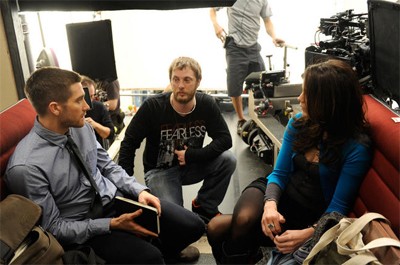 Access: Source Code:
Access: Source Code:
When activated, the Access: Source Code feature drops a small dial in the lower-left portion of the screen, which counts down to the bursts of content that arrive at odd-and-end points on the screen. Small white font in the dial annotates what kind of material will be presented, which ranges from Cast/Crew interviews to audio recordings from theoretical physics expert Sergei Gukov. Small trivia bits discussing things from other instances of time travel in art and literature to things as simple as the likelihood of back-to-back holes-in-one on a golf course. The insight from Gukov offers glimmers of insight, though mostly affirmative explanations to scenes and nothing terribly in-depth, while the "Focal Points" takes a hefty voiceover and elucidates a few scientific points. It's a fine enough experience, though nothing to really merit much fanfare.
Commentary with Director Duncan Jones, Jake Gyllenhaal, and Writer Ben Ripley:
This commentary track drops the trip together, and it's clear that they have very distinct styles of conversation. Jones and Gyllenhaal trade revelations about their experiences working on the film, such as the inspiration Jones leaned on for the lighting in Colter's pod (and a sharp point about the window) and the symbolism behind its condition to the way Jones shifted around the locations to freshen up the visual style. Ben Ripley pops in for more scholarly (and insightful) points, where he talks about the original time-span of the source code and what he modeled the pod after. They start off a little rigid in trying to find a conversational rhythm, interjecting points while trying to get the energy going, but they start moving along later in the track while they dip into more engaging discussion about the meat of the film. It's also refreshing to hear frank questions in the commentary, such as Ripley mentioning he wasn't on-set while Jones was working with Jeffrey Wright and asking where they ascertained the angle for his character.
Final Thoughts:
Source Code takes Duncan Jones' directorial prowess towards exhilaration within a clever science-fiction premise, proving his versatility can stretch from the artful, meditative atmosphere of Moon to the shrewd orchestration of intelligent suspense on display here. Within Colter Stevens' experiences through eight-minute save-the-day bursts -- where he copes with a ghostly yet kinetic digitally-created environment as he scrambles to unearth a terrorist -- the pacing pulls no punches within the razor-sharp flow, while mindfully peeling away layers of both mystery and deeper feeling from the strained soldier's maddening situation. More than anything, it's an immensely gripping thrillride that doesn't shy away from the flashes of underlying thought it possesses, from metaphysical pondering and soldierly self-sacrifice to the subtle way things could change in the universe with slightly-different decisions made. Summit Entertainment's Blu-ray zips along with appropriate, tightly-rendered audiovisual properties that even edge out the theatrical presentation a bit, while presenting a decent audio commentary and a suitable, if shrug-worthy interactive in-movie experience. Highly Recommended.
Thomas Spurlin, Staff Reviewer -- DVDTalk Reviews | Personal Blog/Site
 Duncan Jones' Moon is a daunting act to follow; within a meditation on loneliness, science, and the extent humanity reaches for resources, the burgeoning director crafted an atmospheric cipher about the significance of individuality out of measured influence from Kubrick's 2001: A Space Odyssey. Source Code marks his venture into bigger-budgeted science-fiction, and it appears to aim for similarly lofty standards by focusing on the nature of choices, fortune, and surveying both in a disastrous situation through, in a sense, "time travel". The fact that it doesn't telegraph the same cerebral punch isn't a slight, as the purpose behind each differs: one revels in cosmos and contemplation, while the other careens through thrills and the occasional explosive burst in the nebulous of undiscovered science. Vigor and some smart flirtations with forethought instead drive this suspenseful second outing from Jones, a less introspective but nevertheless catching achievement.
Duncan Jones' Moon is a daunting act to follow; within a meditation on loneliness, science, and the extent humanity reaches for resources, the burgeoning director crafted an atmospheric cipher about the significance of individuality out of measured influence from Kubrick's 2001: A Space Odyssey. Source Code marks his venture into bigger-budgeted science-fiction, and it appears to aim for similarly lofty standards by focusing on the nature of choices, fortune, and surveying both in a disastrous situation through, in a sense, "time travel". The fact that it doesn't telegraph the same cerebral punch isn't a slight, as the purpose behind each differs: one revels in cosmos and contemplation, while the other careens through thrills and the occasional explosive burst in the nebulous of undiscovered science. Vigor and some smart flirtations with forethought instead drive this suspenseful second outing from Jones, a less introspective but nevertheless catching achievement. Penned by Species sequel writer Ben Ripley, the concept drops an army helicopter pilot, Coltor Stevens (Jake Gyllenhaal, Brokeback Mountain), in a passenger car of a commuter tram leading into Chicago, only he doesn't know how he arrived and why the woman (Michelle Monaghan, Kiss Kiss, Bang Bang) sitting across from him keeps using the name "Sean" in her casual, flirtatious chatting. After eight minutes of confusion -- accompanied by the popping of an energy drink, the spill of coffee of his shoe, the stamping of a tram ticket, and suspicious glancing about at the passengers -- an explosion engulfs the tram and Colter abruptly pops into a dark room cluttered with computer screens and mechanical devices. He discovers, through guidance from Capt. Colleen Goodwin (Vera Farmiga, Up In the Air) over a camera connection, that he's just relived the last eight minutes in the life of Sean Fentress before a terror attack occurred, because he's implanted in a secret military "source code" project to discover who set off the bomb. And he's going to have to go in again -- and again -- to cull more details.
The explanation behind the way time would be recreated was something that both sparked my curiosity and caused some trepidation upon entering Jones' picture, but Ben Ripley's script -- a nimble mix of Groundhog Day playfulness with Philip K. Dick-caliber gravity -- navigates the premise with a steady hand and a clever eye. Explained as something of a neural recording (a "dimming lightbulb") filtered through a complex computer network that blends projected memories with technological metaphysics, the science-fiction infrastructure in Source Code convinces without beleaguering the point, tapping into the malleable alternate-reality fabric similar to Inception or The Matrix but with a levelheaded keel. We're not meant to linger on the physiology present in the explanation that wiry Dr. Ruthledge (an over-edgy Jeffrey Wright) rattles off, but you can't help but quietly marvel at its shrewd orchestration and the way it cranks the film's gears like a well-oiled machine.
 Source Code doesn't dwell on the science that closely because it's a tightly-wound thriller constructed to move along quickly, and move it does. Unlike the methodical progression in Moon that gradually builds mania within a man restrained by his disconnected state, it sprints zealously forward through each crack that Colter takes at solving the case within the eight-minute span, reveling in minor situational shifts -- and how he communicates with the passengers, notably Christina. Energy spikes from the very moment he jolts awake in his seat, using the repetition to propel a sense of Hitchcockian mania within his acclimation to the project; Duncan Jones grabs onto a fierce sense of momentum as he navigates each of the frantic soldier's attempts to discover what's going on, where he won't have to answer for the consequences of actions, such as pulling a gun on a suspect or dishing out $100 from his wallet for assorted purposes.
Source Code doesn't dwell on the science that closely because it's a tightly-wound thriller constructed to move along quickly, and move it does. Unlike the methodical progression in Moon that gradually builds mania within a man restrained by his disconnected state, it sprints zealously forward through each crack that Colter takes at solving the case within the eight-minute span, reveling in minor situational shifts -- and how he communicates with the passengers, notably Christina. Energy spikes from the very moment he jolts awake in his seat, using the repetition to propel a sense of Hitchcockian mania within his acclimation to the project; Duncan Jones grabs onto a fierce sense of momentum as he navigates each of the frantic soldier's attempts to discover what's going on, where he won't have to answer for the consequences of actions, such as pulling a gun on a suspect or dishing out $100 from his wallet for assorted purposes. Fate and the (in)ability to control one's surroundings also give Source Code an atmospheric, faintly existential draw, where Colter's persistently reminded that his processions through the eight-minute bursts have no consequence or importance outside of his discovery of the terrorist. At least, at first. Interestingly, some of the themes that bolstered Moon carry over here, where a world-weary man can't help but feel trapped in a situation where he's forced to do the bidding of a greater good without being able to address his own concerns -- mainly why the last image he remembers before repeatedly entering the source code is of his helicopter crashing in Iraq. That's where the film's taciturn pensiveness peeks out from the tension; Colter continually makes advances through each blurred attempt, slip-streaming past what are essentially ghosts, while in tandem unearthing the details of his past so he can cope with the clutches of the source code's demands.
 Jake Gyllenhaal proves an ample choice for the addled Colter Stevens, a man unsure of reality around every corner he turns -- yet able to roll with the punches. His spastic motions, when sweating bullets on the train or growing frustrated in his dark chamber, shape the soldier into a capably-grounded but frenetic entity who bends with the pressings demands of tirelessly scrambling until he's blown up, over and over. The intuition he brings to Colter's wide-eyed appraisal of those he's closest to becomes an even bigger asset than his turbulent manner, though; the rapport he strikes with Michelle Monaghan becomes an endearing anchor, while his back-and-forth with Farmiga's Goodwin often touches on emotional chords as she, a fellow soldier with obligations, uncomfortably withholds information. The tense climate created between Colter and those he trusts emphasizes the trying human weight pressing down on his circumstance, adding well-defined sparks of empathy within the suspenseful rush.
Jake Gyllenhaal proves an ample choice for the addled Colter Stevens, a man unsure of reality around every corner he turns -- yet able to roll with the punches. His spastic motions, when sweating bullets on the train or growing frustrated in his dark chamber, shape the soldier into a capably-grounded but frenetic entity who bends with the pressings demands of tirelessly scrambling until he's blown up, over and over. The intuition he brings to Colter's wide-eyed appraisal of those he's closest to becomes an even bigger asset than his turbulent manner, though; the rapport he strikes with Michelle Monaghan becomes an endearing anchor, while his back-and-forth with Farmiga's Goodwin often touches on emotional chords as she, a fellow soldier with obligations, uncomfortably withholds information. The tense climate created between Colter and those he trusts emphasizes the trying human weight pressing down on his circumstance, adding well-defined sparks of empathy within the suspenseful rush. Along its briskly-paced 93 minutes, powered by a vigorous score from Chris Bacon and lucid photography from Don Burgess (The Book of Eli), Source Code peels away layer after layer atop its tense sci-fi riddles at a consistent rate, faltering little in tempo as it tears towards its conclusion at full-steam. And once it escalates to its climax, blending crowd-pleaser consciousness and relentless stakes with an astute level of cerebral stimulation that fits the film's aims, the pieces snap together into a realized and enthralling piece of science-fiction, filling in the gaps left from a lack of artful ingenuity with a clear perspective on the spirited tension that the story possesses. Source Code makes it clear that Jones not only defies any one-trick pony labels that might've befallen him, but that he can also invoke something inimitable and captivating within the confines of an upfront, well-orchestrated premise.
The Blu-ray:
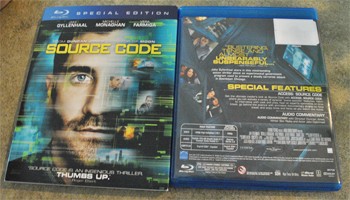 | 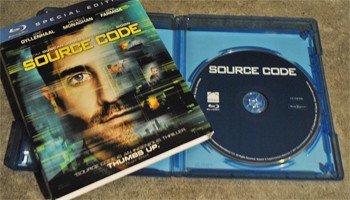 |
Video and Audio:
Source Code jolts into the high-definition arena in a 1.78:1 1080p AVC encode from Summit, which cradles Don Burgess' cinematography in a fashion precisely like that of the theatrical presentation -- only crisper. The stubble against Gyllenhaal's face in close-ups and the fabric within clothing and carpeting pops from the frame while captured in the well-lit commuter train cars, all shot on film, while the digital RED-shot dusty darkness within his wire-laden source code capsule falls into an empty-colored disposition properly. Metallic shimmering against rail chairs and the famous Chicago "bean" fluctuates aptly, the billow of fire grasps at robust color shifts that stay true to the computer-generated intentions without pouring out of control, while contrast never tilts off kilter to a degree that masks detail. With the rush of trains and the consistent movement of Colter Stevens through the train, Summit's Blu-ray presentation preserves the exquisite minute details with aplomb, sharp and stylish to Jones' intent.
A fierce-moving DTS HD Master Audio track keeps pace with the stellar visual treatment, capturing the subtle details and boisterous exertions with fine sonic energy. The snap of an energy drink lid and the splash of coffee on Colter's shoe showcase the design's ability to harness minor details, while the energetic banter between Gyllenhaal and Monaghan capture verbal clarity with sustainable audibility -- about as crisp as the theater, which wasn't exceptionally razor-sharp. The punch resides in Chris Bacon's ever-throttling score and the persistent explosions within the train, which pummel the lower-frequency channel often and with a deft punch, both in the billowing fire and the sharp musical jabs. The echoes within Colter's pod hit the walls with an appropriately muted muffle, alongside Gyllenhaal's heightening aggravated vocal tone. A lot of aggressiveness sneaks up on you in Source Code, and the aural presentation grasps it and barrels forward until the credits roll.
Special Features:
 Access: Source Code:
Access: Source Code: When activated, the Access: Source Code feature drops a small dial in the lower-left portion of the screen, which counts down to the bursts of content that arrive at odd-and-end points on the screen. Small white font in the dial annotates what kind of material will be presented, which ranges from Cast/Crew interviews to audio recordings from theoretical physics expert Sergei Gukov. Small trivia bits discussing things from other instances of time travel in art and literature to things as simple as the likelihood of back-to-back holes-in-one on a golf course. The insight from Gukov offers glimmers of insight, though mostly affirmative explanations to scenes and nothing terribly in-depth, while the "Focal Points" takes a hefty voiceover and elucidates a few scientific points. It's a fine enough experience, though nothing to really merit much fanfare.
Commentary with Director Duncan Jones, Jake Gyllenhaal, and Writer Ben Ripley:
This commentary track drops the trip together, and it's clear that they have very distinct styles of conversation. Jones and Gyllenhaal trade revelations about their experiences working on the film, such as the inspiration Jones leaned on for the lighting in Colter's pod (and a sharp point about the window) and the symbolism behind its condition to the way Jones shifted around the locations to freshen up the visual style. Ben Ripley pops in for more scholarly (and insightful) points, where he talks about the original time-span of the source code and what he modeled the pod after. They start off a little rigid in trying to find a conversational rhythm, interjecting points while trying to get the energy going, but they start moving along later in the track while they dip into more engaging discussion about the meat of the film. It's also refreshing to hear frank questions in the commentary, such as Ripley mentioning he wasn't on-set while Jones was working with Jeffrey Wright and asking where they ascertained the angle for his character.
Final Thoughts:
Source Code takes Duncan Jones' directorial prowess towards exhilaration within a clever science-fiction premise, proving his versatility can stretch from the artful, meditative atmosphere of Moon to the shrewd orchestration of intelligent suspense on display here. Within Colter Stevens' experiences through eight-minute save-the-day bursts -- where he copes with a ghostly yet kinetic digitally-created environment as he scrambles to unearth a terrorist -- the pacing pulls no punches within the razor-sharp flow, while mindfully peeling away layers of both mystery and deeper feeling from the strained soldier's maddening situation. More than anything, it's an immensely gripping thrillride that doesn't shy away from the flashes of underlying thought it possesses, from metaphysical pondering and soldierly self-sacrifice to the subtle way things could change in the universe with slightly-different decisions made. Summit Entertainment's Blu-ray zips along with appropriate, tightly-rendered audiovisual properties that even edge out the theatrical presentation a bit, while presenting a decent audio commentary and a suitable, if shrug-worthy interactive in-movie experience. Highly Recommended.
|
| Popular Reviews |
| Sponsored Links |
|
|
| Sponsored Links |
|
|
| Release List | Reviews | Shop | Newsletter | Forum | DVD Giveaways | Blu-Ray | Advertise |
|
Copyright 2024 DVDTalk.com All Rights Reserved. Legal Info, Privacy Policy, Terms of Use,
Manage Preferences,
Your Privacy Choices | |||||||









